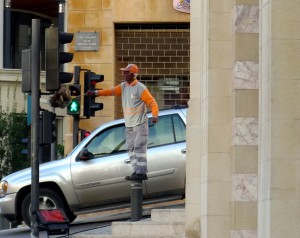Oscar Wilde once quipped that America was the only country to go from barbarism to decadence without civilization in between. Lebanon, it could be said, has swung from civilisation to civilisation with barbarism and decadence at every turn, from the Phoenecians who are claimed to have invented the alphabet down to today’s technophile bling-addicts.
Every day the population faces a black out of three to six hours, but the Virgin Megastore in the rebuilt downtown is open til midnight. Adverts for four-door refrigerators line the highway, where, in equally disproportionate measure, beat up old bangers with bits dropping off rub shoulders with Jaguars, Maseratis, Porsches, Ferraris. The political situation is unpredictable, sometimes balancing on a knife-edge above the abyss of civil conflict, but consumerism triumphs over all as the Lebanese focus on long-term issues such as nose jobs and the latest smartphone. The communications infrastructure struggles to keep up with growth in demand and internet and telecom are more expensive than in Europe, but still everyone knows everything about everyone before it even happens. The traffic lights, a recent addition to the Beiruti landscape, are largely ignored, but the street cleaner tends them with his feather duster. Perhaps he sees them, as they indeed are, as urban ornaments.
Barbaric and decadent are the best terms to describe local urbanism trends, as beautiful though dilapidated Ottoman-era houses are bulldozed to make room for the luxury eyesores being pulled relentlessly skywards by dusty orange cranes. The coast is not yet the concrete stranglehold of southern Spain but the ambition is clearly there. Beaches have been obliterated in favour of beach resorts, where urbane bikinid Beirutis can sip cocktails, sunbathe on loungers, and swim in pools without once getting sand in their ice cream or seaweed in their hair. The sea view is blocked by luxury hotels with rooftop bars, shopping malls and factories, none any more attractive than the others. The cement works near the seafront of Chekka are an odd collection of shapes, like all-grey chocolate factories, tirelessly fuelling the spread of urban sprawl along the coast. Insatiable property developers move constantly uphill in the quest for a less spoilt view, reaching the highest, greenest corners of the country. Quarrying – sometimes unauthorised – has left great white scars in the hillsides.
But the scalped slopes give way further inland to dense green carpets, terraced orchards and eventually the majestic cedars above Qadisha valley, where saplings are being nurtured among the ancient heavyweights providing some hope for the country’s amazing natural heritage. Along the same lines, a huge campaign is underway to muster votes for Jeita Caves, a finalist in the new seven wonders of the world. Contrast is Lebanon’s byword; it just doesn’t do straightforward civilisation.
